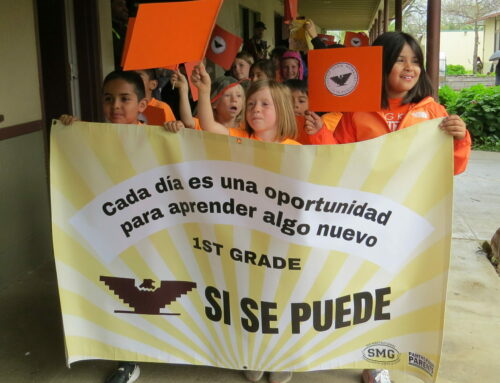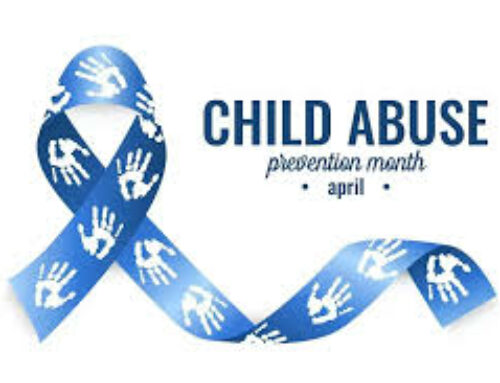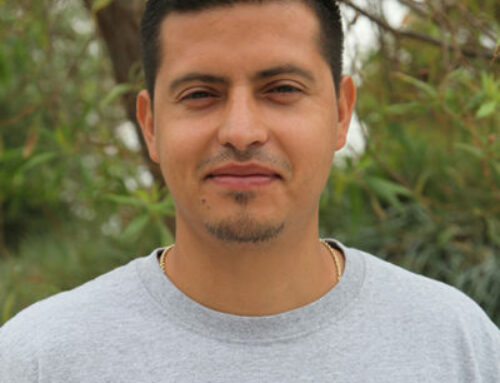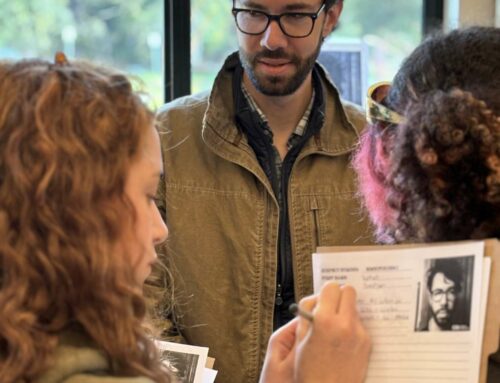Nonprofit places counselors in South Valley schools
Published in the December 7 – 20, 2016 issue of Morgan Hill Life
By Marty Cheek

Photo by Marty Cheek — Discovery Counseling Center celebrates a ribbon cutting Nov. 29 at the nonprofit group’s new Gilroy location.
For several years, the nonprofit Discovery Counseling Center has partnered with the Morgan Hill Unified School District to provide counseling services to all schools in the district, providing them with therapists at each school at least one day per week. The services are available to all students with parent permission.
Recently, the center started expanding south to help students in the Gilroy Unified School District as well as Gavilan Community College. It recently opened an office site in Gilroy off Church Street.
“Our mission is to help our community have people of strong individual character and families,” said Larry McElvain, executive director at Discovery. “We’re finding community outlets to provide services, so we’re not like traditional counseling centers where you put a shingle up and wait for people to come to you. We figure out ways to go out into the community and engage people where they are.”
With its new site helping to establish Discovery as an additional source for student help in the South Valley, the center has recently begun talks with staff at Solorsano Middle School and Brownell Middle School to build their therapy program for students in those schools.
“Our in-goal is to have a counselor on the campus all the time or one day at least in every school in Gilroy,” McElvain said.
Currently in Morgan Hill, Discovery has therapists in all the district’s three high schools, two middle schools and all the elementary schools, said Glen Drake, a Discovery counselor who serves as the school coordinator.
Seeing a child with behavioral issues interact with other students or teachers in an environment such as a playground or classroom is more effective in diagnosing problems than meeting them in an office where the child is uncomfortable because it’s not a place they are use to.
“We can be consultants to teachers where we go into a school and observe kids right there in their learning environment,” he said. “That’s a natural place for kids to be. It’s sometimes difficult to bring kids to an (off school) center like this (in Gilroy), when it’s better for them for us to be on campus where they are and just get them out of class for half an hour or an hour. We can provide intervention that they would not get normally.”
Counselors at high schools can have case loads of 700 or more students, he said. Many elementary schools don’t have counselors, but only psychologists who just do student testing. For Discovery counselors to be on the campus and have kids referred to the program by teachers or administrators is a opportunity for them to impact not only the kids but also the families, Drake said.
“One of the ways I like to think about it is that historically therapy has always been about getting clients into your office, which is a private environment where they’re safe to talk about their issues,” McElvain added. “But we have the chance to do ‘in vitro’ therapy — real-life stuff. Our counselors go into the classrooms, they watch the kids fighting or whatever the issues are, and that’s what young kids need.”
Providing therapy to children with behavior issues helps improve the classroom environment and academic learning for other students as well, he said. If the child is a problem student, the teacher often needs to start focusing on him or her, and so the other students lose out by not receiving the academic attention they need — so their learning hits a wall as well.
“We’re really a partner with the teacher. We want a team approach,” Drake said. “We want to be a part of the school and assist the teachers in some ways to make a difference with kids.”
Often, the child starts working with the counselor through “play therapy” where they engage with each other in games and build a trust between them. Then the child can better express their emotional issues so the therapist can understand the root cause of the problem behavior.
“If kids experience some trauma at home, all the schools see is that their grades are suffering, they’re withdrawing, so they don’t really have any idea about what’s causing the issues,” McElvain said. “By marrying the schools with therapy, we can actually be an extra arm in the schools to help those families find out what’s really going on and find some resolution.”
The MHUSD pays Discovery Counseling Center some funds through California’s Local Control and Accountability Plan (LCAP) to participate in the program. The center keeps the costs down by bringing in graduate students who need to do 250 hours of internship time in order to be able to earn their degree, he said.
“We put them into schools without pay and we train them and work with them,” McElvain said. “Glen meets with them every week, so they get a lot of intensive training during the year. And for the schools, the program is a minimal cost to them.”
The center also takes Medical and private insurance funding if available for the students. Students without insurance are seen on a pro bono basis by the counselors, McElvain said.
Drake worked as a guidance counselor in schools for about 25 years, and said at that time in his career he had to deal with about 350 students a year. Now, high school counselors have about 750 students, so they don’t have the resources for dealing with any issues unless it’s academic such as how to get into college.
“To be able to make a difference now with kids more personally makes a big difference,” he said. “The high schools don’t have time to do that, so it’s a great opportunity. Teachers love to have us on campus.”
Recently, Discovery Counseling Center received a $18,000 grant from Kaiser-Permanente for funding a “life skills” program for Morgan Hill’s sixth graders in the district. These include skills in communication, health and family, healthy relationships, drug and alcohol awareness, drug resistance skills, bullying defense skills, and emotional training skills to handle anger, anxiety and depression.
“It’s primarily relational and helping trying to build resilience,” McElvain said.
Last year, Discovery conducted the life skills programs with MHUSD eighth graders with a small bit of funding and it proved to be so beneficial that it was expanded.
“We’re providing some in-teacher in-servicing as well,” Drake said. “I’ve been to all the (Morgan Hill) high schools last year and now the elementary schools and I’m helping teachers learn how to identify mental health issues in the classrooms. They need to know how to talk with the kids and get the students the counseling that they need and get the referrals.”






